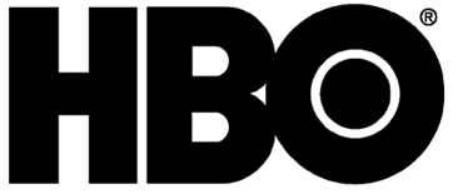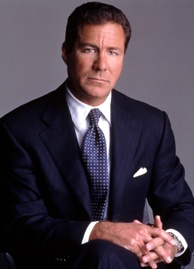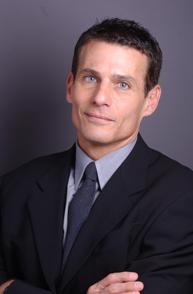Lunch at Michael's with HBO's Michael Lombardo and Richard Plepler

During lunch three weeks ago, when life was relatively normal and the strike by members of the Writers Guild of America was little more than a vague impending threat, HBO programming group president Michael Lombardo and co-president Richard Plepler were spilling over with excitement about the hugely impressive lineup of original series and other projects coming from the network in the near future.
That lineup boasts the return to HBO of three of its most valued writers and show-runners, Alan Ball (Six Feet Under), David Milch (Deadwood) and Darren Star (Sex and the City), each with a new series; a renewed commitment from Larry David for at least one additional season of Curb Your Enthusiasm; a new drama series from Sopranos writer Terry Winter with Martin Scorsese as an executive producer; the final season of one of television's finest and most under-appreciated drama series, The Wire; and the long-awaited arrival of John Adams, a seven-hour miniseries adaptation of the Pulitzer Prize-winning novel by David McCullough.
Plepler (pictured right) and Lombardo (pictured below) were equally enthusiastic about their success in the digital arena, which has proved crucial to the growth of at least two new series they introduced this year, Tell Me You Love Me and Flight of the Conchords.
"HBO On Demand is the most monetized and the most successful digital piece in the television industry," Plepler told Jack Myers and myself. "It is the digital expansion of our service. Our 30 million subscribers are looking to us for a lot of different things: sports, movies, documentaries, miniseries, movies, and series. Sixty percent of Hollywood's movie output is on HBO. The addition of On Demand, which includes the movies, is a very important part of our price value proposition."
Thanks to HOD, "people are coming to our product midway during the season or after the series ends," Plepler continued. "People came to Rome after they heard about it. We're seeing it now, very clearly, in the HOD numbers for Tell Me You Love Me. Three and a half million people are watching it. Over two-thirds of its audience is watching that show on its non-premiere nights. (The decidedly R-rated Tell Me concluded its first season last Sunday and has been renewed for a second year.)
"As viewing migrates more and more toward On Demand use, that's the sweet spot for us," Plepler said. "People are accustomed to it with HBO and it plays to our strengths." HOD was also instrumental in making the struggling Flight of the Conchords enough of a success to merit a second season, he noted. "HOD has been extraordinary for that show. People are going back and watching it a second or third time on demand."
The next digital extension for HBO will be the implementation of high-definition. Plepler noted that HBO is "HD ready on 90-95 percent of our programming."
Of Tell Me You Love Me, which began life last summer amid a storm of controversy surrounding its use of full-frontal male and female nudity and its graphic depiction of sex acts, Plepler said, "It is one of the most honest and bravest attempts to look at intimacy that has ever been on American television. I think the longer people are living with it and allowing it to breathe and the characters to develop the more comfortable they are getting with it."
The next big original series on HBO will likely be True Blood, the first series fully developed by Lombardo and Plepler. (Lombardo, a 21-year veteran of HBO, and Plepler, who has been with the network since 1992 were named to their current positions in June 2007. Los Angeles-based Lombardo oversees HBO's programming group and all of its west coast operations. New York City-based Plepler oversees the network's original programming and corporate communications groups.)
The premise of True Blood, Lombardo shared, is that "the Japanese have invented artificial blood, allowing vampires to come out of the closet. They are sub-class citizens. It's an interesting window into our anxiety, watching this world. Alan Ball is basing it on the very popular southern gothic vampire novels [by Charlaine Harris]. He bought the first book in an airport and couldn't put it down." The pilot has been completed and the second episode of True Blood is currently in production.
Meanwhile, David Milch is busy developing a new series titled 1971, about corruption inside the New York City police department in the early Seventies. It will be told "through the voice of Bill Clark," Plepler said, noting that Clark was an advisor to Milch on NYPD Blue. "Bill is a Vietnam veteran who came back from the war and went undercover to infiltrate the Black Panthers. He came out of that with a gold shield at 31 years old. Nobody understood how this kid got [the gold shield]. It is through Bill's eyes that we will see what was going down in law enforcement. David is writing as we speak. He has been talking about this for five years. The good news is, David's in the house."
Milch, of course, was the creator of the much-admired Western saga Deadwood, which was a success for the network, and the ill-fated drama about surf culture John From Cincinnati, a high-profile failure for HBO this past summer. "We put an unbelievable strain on John, in terms of the schedule," Lombardo admitted. "I think the show was better than the reviews."
John might have survived, Plepler offered, "had it come at a different time, not following the iconic phenomenon of The Sopranos, and had people looked at it without the expectation that it was somehow replacing The Sopranos, which was never our intent. There were such high expectations with it following Deadwood and The Sopranos. As David himself said, 'the auguries were not the best.'"
"In retrospect, to not continue with Deadwood was a mistake," Lombardo observed.
On a lighter note, Lombardo revealed that Larry David is "already at work on a seventh season" of Curb Your Enthusiasm. Expect less of a break between season six and season seven than the 21-month gap between season five and season six. Curb, Lombardo asserted, "took too long to come back."
"Wait until you see where Larry goes [in season seven]," Plepler grinned. "We hope he stays for a very long time."
Among the other programming news Lombardo and Plepler shared: Darren Star's new series will be titled Diary of a Manhattan Call Girl, the final season of The Wire will largely focus on the media in Baltimore, and the series from Terry Winter and Martin Scorsese will be set in Atlantic City in the 1920s. They also have in development a series from novelist Carl Hiassen (Strip Tease, Skinny Dip) about a golfer in trouble with the mob who is living in the witness protection program and one from Michael Tolkin (The Player) about bikers.
The John Adams miniseries, starring Paul Giamatti, Laura Linney and Tom Wilkinson, will premiere March 15. "We flew down to show it to David McCullough with the natural trepidation that you are showing it to the master," Plepler said. "He had tears in his eyes."
And what about Sopranos creator David Chase? Are there any projects in development with him? "He's still decompressing," Lombardo replied. "You're beaten down [after a run like that]."
Interestingly, our conversation at Michael's restaurant was interrupted at three different times by appearances of past HBO executives at our table: First, former president of film programming Steve Scheffer, then former executive vice president of sales and satellite operations Larry Carlson, and lastly former HBO chief Michael Fuchs.
"Michael was the first person to boldly go where no one had gone and say there is an original programming model for pay cable television that has a real place in the popular culture," Plepler told us after Fuchs left the table. "The idea that you could break through the zeitgeist with something on HBO or Showtime was a very revolutionary notion. There were many, many people who felt that it was not do-able. He deserves a tremendous amount of credit for pushing that along and really birthing the original programming model at HBO. I don't think anyone would dispute that. The tipping point for HBO was not The Sopranos or Sex and the City. It was The Larry Sanders Show, which was Michael's show. That was in 1992. Sanders convinced people that there really was a way to do something with an original voice, to do something you couldn't get anywhere else, to do something that was worth paying for and that frankly was painting on a different canvas."
With these new series and much more original programming in the pipeline HBO is well positioned to remain dominant in the increasingly crowded media landscape. "We have a pretty simply mantra, which is paraphrasing the Clinton campaign mantra of '92: 'It's the programming, stupid,'" Plepler concluded. "If we continue to deliver high quality, distinctive, differentiated work and give our customers the opportunity to watch that when they want to, we think our business model is going to continue to grow. We're very well suited to the current environment because we're not selling eyeballs to advertisers. We're not selling CPMs. We are selling a promise that our brand is going to deliver quality and excellence in a lot of different areas of entertainment. That's always going to be something people are going to want even with unprecedented levels of stimuli out there."



